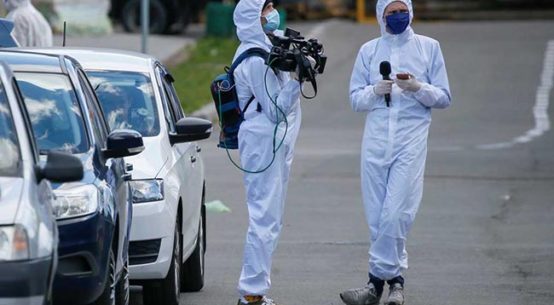We are in the midst of so many crises across the Middle East and North Africa (MENA) region: the most unequal, water scarce, least democratic region in the world, with the widest gender gap, multiple armed conflicts raging across it, and fragile states on the brink.
For weeks, the region has been struggling with sand storms and dust, affecting the health and well-being of all, especially women and their children. Back in January the images of snowstorm hitting refugee camps in Syria were haunting.
Women shoveling snow and melting it to use for washing and cooking was a jarring insight into how women in our region will be burdened by the climate emergency. Increasingly people here are feeling the burn of the climate crisis, through extreme weather conditions, heat waves, snowstorms, desertification and draughts.
The International Panel on Climate Change has projected that the MENA region will be one of the world’s regions hit hardest by climate change in the 21st century.1
On this World Environment Day, June 5, the urgency of the climate emergency is creeping closer and closer to home. Oxfam’s recent report “Inequality kills” warned that 231,000 people each year could be killed by the climate crisis in poor countries by 2030. This is a conservative estimate, millions could die in the second half of this century.
The root of many of challenges in MENA is the patriarchal nature of societies and the woeful level of participation of women. From the formal economy to government, women’s representation and participation rates are some of the lowest in the word.
Women in MENA are removed from the core of public life and political engagement, therefore, our ability to manage the next looming challenge of a climate catastrophe is set to fail. Unless climate change is seen as a feminist issue- in need of a feminist response- its impacts cannot be managed effectively.
Vital to addressing the climate crisis is recognizing the inequalities that perpetuate it and the impact of such inequality on men and women in the region. There is no shortage of evidence that climate change is incredibly gendered.
The UN estimated in 2018 that 80% of people displaced by climate change were women. It leads to internal displacement and migration where women disproportionately suffer different forms of gender-based violence, shoulder the bulk of family responsibilities like water collection and care work, and further entrenches poverty.
Water scarcity impacts women’s ability and accessibility to basic water and sanitation services, leaving them heating snow or walking long distances to find household water. Climate change increases women’s existing difficulties accessing assets and resources.
Women in many countries across MENA are already pushed to cultivate less fertile land, diminishing their ability to produce food and limiting their voices.
As the climate crisis takes hold at breakneck speed, we are grossly underprepared and underequipped to manage and adapt to its impacts as long as women lack the agency they need to be part of an effective response to this new climate normal.
As goes the long-worn rally cry, there cannot be climate justice without gender justice. One cannot be achieved without the other. We know women in the region will be most impacted by climate change. It leads to internal displacement and migration where women disproportionately suffer all forms of violence as they shoulder the responsibility of care work and household responsibilities.
The layered crises we face here in the region of gender disparity, inequality and climate are all interlinked, however the intersectionality of climate change and gender in MENA is ignored. It is often absent from the government and civil society responses and even from the agenda of feminist movements and women rights organizations, with concerns that this may divert feminist action on poverty and gender-based violence for example.
However, the linkages are important because they are at the cutting edge of addressing systemic and oppressive power structures that favor rich nations over poor nations, urban centers over rural areas, those with education versus those without, those who have access to technology verses those who do not and, ultimately, men over women.
For far too long in the hierarchy of needs across the region, climate change as been seen as the least pressing issue effecting lives, however we cannot triage what competing crises can and cannot wait.
As droughts dry up farmland, water sources evaporate as rivers shrink, and rainfall becomes more scarce, the impacts of climate on the region are becoming increasingly dire. More dire still is that women are not on the forefront of conversations about the future.
They are left behind the same way they are ignored in conversations related to peace and security, reconstruction and economic recovery. Such conversations are controlled by the same power structures that created them This time, they cannot be left behind.
Climate justice cannot be seen as an issue of the west, or of the privileged. It is an integral, cross cutting issue that must be coupled with gender equity for us to be equipped to battle the growing challenges it is bringing us.
There is no doubt women are the key to addressing these challenges. The evidence is clear. By organizing, mobilizing and building voices and agency, women can lead the climate conversation and set an agenda for change.
The writer is Oxfam Regional Director for Middle East and North Africa (MENA)

